
Top Mathgraduate schools

Top Math graduate schools
Looking for the top Math graduate schools? We put together a comprehensive list of the best graduate programs for Math, and put the results below. We include the acceptance rate, average GRE scores, and a brief description of each - all the information you need to kick start your research. Read on!
Table of contents
California Institute of Technology Math school acceptance rate
California Institute of Technology's Math acceptance rate is 24.00%.
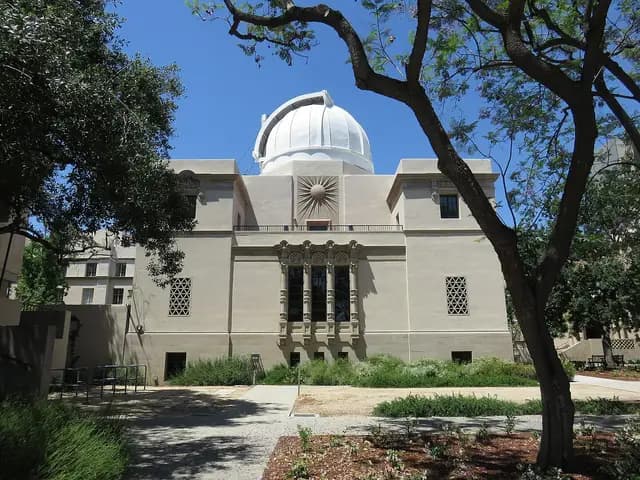
Antony-22 / Wikimedia Commons / "Robinson Laboratory Caltech 2017a" / CC BY-SA 4.0
Caltech's mathematics department is renowned as one of the top in the nation, offering a highly rigorous graduate program. Geared towards preparing students for research careers in academia, industry, or government, the program exclusively admits those pursuing a Ph.D. Over the past fifteen years, Caltech has granted around 90 doctorates in mathematics, with many graduates securing attractive positions as university faculty members or researchers in industry and government. The department fosters a conducive environment for creative research, with a small student body, a sizable faculty, and an informal atmosphere that facilitates close faculty-student interactions. In addition, Caltech boasts an impressive mathematics library and provides students with extensive computing resources on campus.
Columbia University Math school acceptance rate
Columbia University's Math acceptance rate is 28.00%.
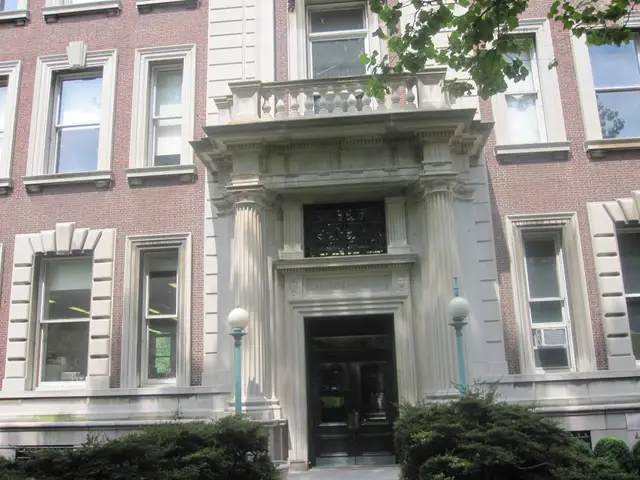
Billy Hathorn at en.wikipedia / Wikimedia Commons / "Mathematics Building at Columbia University" / CC BY-SA 3.0
The Columbia University Mathematics Department, in collaboration with Barnard College, provides comprehensive mathematics courses across different degree programs. It comprises 51 faculty members, including 30 senior and 21 junior professors, along with 18 adjunct professors, 12 Post-Doctoral Research Fellows and Scientists, and 57 PhD students. The department focuses on research activities within sub-fields of mathematics, with faculty members forming groups based on shared interests. The PhD program emphasizes research and university teaching, while the MA degree is obtained after completing residence units and a qualifying examination. Doctoral students receive five years of full fellowship support, with a teaching commitment for four years during their second year onwards. Fellowships recognize academic achievement and promote research and teaching experience for graduate students.
Harvard University Math school acceptance rate
Harvard University's Math acceptance rate is 13.00%.

Gunnar Klack / Wikimedia Commons / "Harvard Science Center Josep Lluis Sert Apr 2014" / CC BY-SA 4.0
The Math PhD program at Harvard University is tailored for students aspiring to become research mathematicians and engage in original mathematical research. Its campus location, Cambridge, Massachusetts, is renowned as a vibrant hub of mathematics, hosting esteemed institutions such as MIT, Boston University, and Brandeis University. Participants will have access to abundant resources, including the Center of Mathematical Sciences and Applications, which facilitates interdisciplinary collaboration through conferences, seminars, and workshops. Graduates have excelled in securing postdoctoral fellowships in academia, with some earning prestigious fellowships like the Clay Fellowship, Simons Fellowship, and NSF Graduate Research Fellowship. Others have pursued careers in industry. Inclusivity and welcoming practices are prioritized through embracing inclusive pedagogy and affinity groups that provide a supportive environment for individuals with shared identities to connect, educate, process, heal, and work together.
Massachusetts Institute of Technology Math school acceptance rate
Massachusetts Institute of Technology's Math acceptance rate is 10.00%.
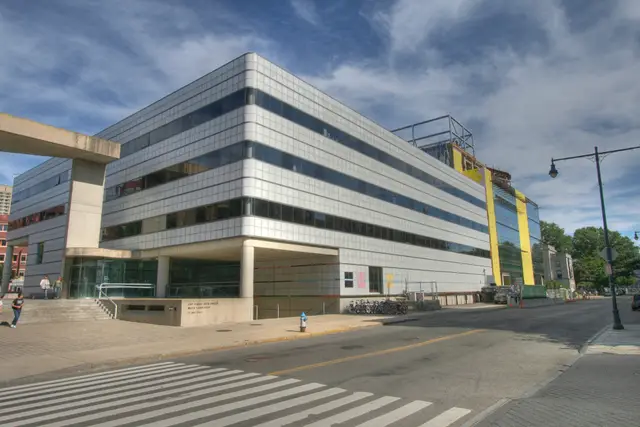
Madcoverbody at English Wikipedia / Wikimedia Commons/ "MIT's Media Laboratory and expansion under construction" / CC BY-SA 3.0
The Massachusetts Institute of Technology (MIT) Department of Mathematics has made notable contributions to various areas of mathematics. The school's emphasis on mathematical physics has led to advancements in quantum mechanics and general relativity. MIT has also been influential in mathematical finance, contributing to the development of option pricing models. Additionally, its focus on applied mathematics and computational science has yielded breakthroughs in fields such as computer graphics and machine learning. These contributions have solidified MIT's reputation as a leading institution in advancing mathematical knowledge. Studying at the MIT Department of Mathematics offers an intellectually stimulating and collaborative environment, working closely with renowned faculty, engaging in cutting-edge research, and preparing for successful careers in mathematics.
New York University Math school acceptance rate
New York University's Math acceptance rate is 27.00%.

ajay_suresh / Wikimedia Commons / "NYU - Silver Center" / CC BY 2.0
NYU's Master's degree in mathematics provides specialized training in real analysis, complex analysis, linear algebra, probability, scientific computing, and differential equations. Graduates have the opportunity to pursue advanced courses in pure and applied mathematics. An M.S. degree from NYU prepares students for careers in government, business, and industry, while a Ph.D. opens up broader options, including joining the faculty of universities, conducting research, or pursuing post-doctoral positions. The program offers individual attention and a customized curriculum. Graduates can explore diverse career paths, such as software design, biostatistics, industrial engineering, imaging science, aerospace mathematics, and economics. NYU Mathematicians are sought after in various sectors, including finance and government organizations like the National Security Agency.
Princeton University Math school acceptance rate
Princeton University's Math acceptance rate is 10.00%.
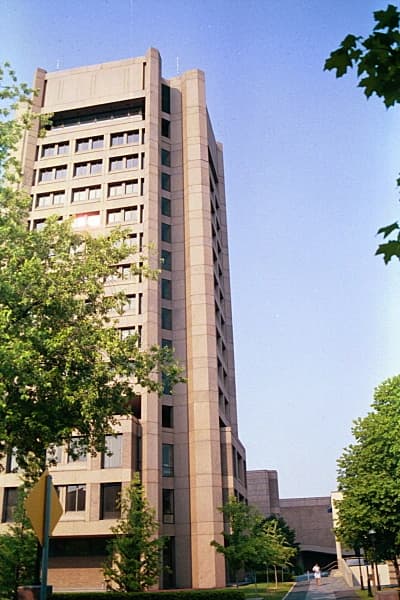
Joseph Barillari at en.wikipedia / Wikimedia Commons / "Fine Hall, Princeton University" / CC BY-SA 3.0
The Department of Mathematics graduate program stands out among other prestigious mathematics institutions in the United States due to its focus on independent research. The program offers extensive research and educational opportunities while maintaining minimal requirements for admission. The student body is highly motivated and diverse in terms of backgrounds. Despite the emphasis on independent work, a strong sense of camaraderie exists among the graduate students, fostering an atmosphere of excitement, stimulation, and support. Additionally, the department maintains a close relationship with the nearby Institute for Advanced Study (IAS), providing students with access to IAS members and seminars. Graduates of the program consistently secure academic positions at leading mathematical institutions and industries, typically completing their dissertations within four to five years.

Achievable GRE - $199
Hit your GRE target score on the first try with Achievable's interactive online exam preparation course. Includes everything you need: unlimited quantitative practice questions, an easy-to-understand online textbook, 24 verbal / reading comprehension practice exams, 250 vocabulary words, and unlimited instant essay grading.
Easy-to-understand online textbook
Infinite randomized questions
200+ quant templates
30+ verbal sections
250 vocab words
Unlimited essay grading
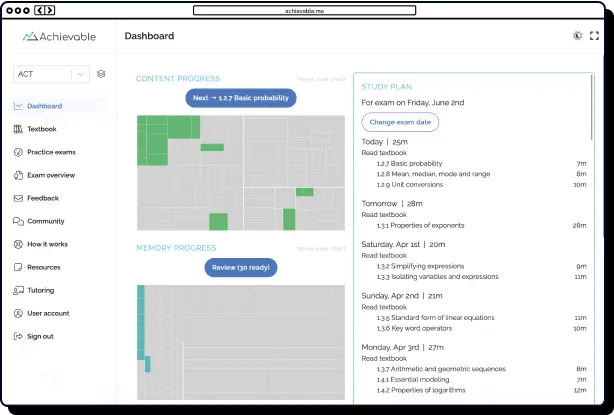
Stanford University Math school acceptance rate
Stanford University's Math acceptance rate is 3.95%.
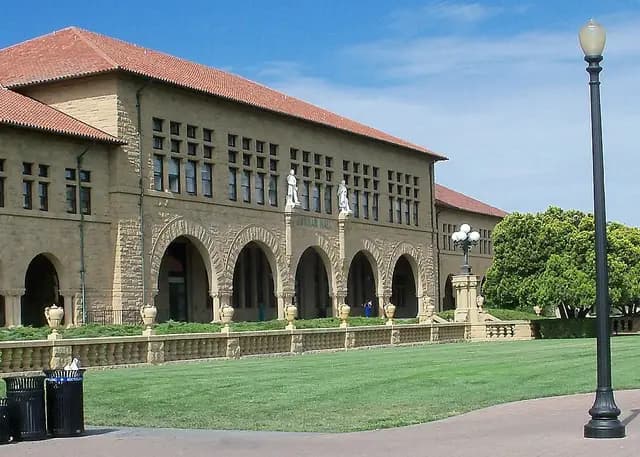
Emma Pease / Wikimedia Commons / "Jordan Hall, Stanford University" / CC BY-SA 4.0
The Department of Mathematics at Stanford University, situated in Stanford, California, is renowned both nationally and internationally for its exceptional contributions to the field of mathematics. Recognized as a leading institution, it offers esteemed programs, seminars, journals, and outreach initiatives to its graduate and doctoral students every year. The department holds a prominent position as one of the top six math PhD programs in the United States, often referred to as the "first tier," alongside prestigious universities such as Harvard, Princeton, MIT, UC Berkeley, and UChicago. Consequently, it attracts a substantial number of highly accomplished American and international students seeking to pursue their mathematical studies in the United States.
University of California, Berkeley Math school acceptance rate
University of California, Berkeley's Math acceptance rate is 8.40%.
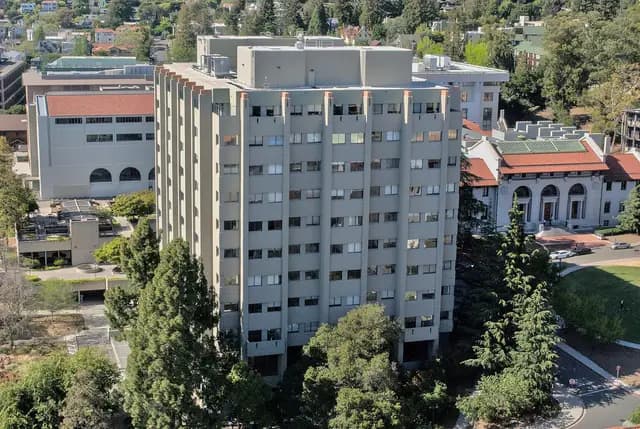
Gabriel Classon (gabeclasson on Flickr) / Wikimedia Commons / "Evans Hall from Sather Tower (52081220749)" / CC BY 2.0
The University of California, Berkeley Graduate School of Mathematics (UC Berkeley Math) stands out for its academic excellence, rich history, and notable achievements. Renowned for its rigorous programs, UC Berkeley Math consistently ranks among the top mathematics departments globally. Its diverse research areas encompass various mathematical disciplines, fostering collaboration and innovation. The department's exceptional faculty, including renowned mathematicians, provide mentorship and engage in cutting-edge research. UC Berkeley Math alumni have made significant contributions in academia, industry, and beyond. With a collaborative environment, notable alumni like Fields Medalists Shing-Tung Yao and William Thurston, and top rankings, UC Berkeley Math remains a world leader in mathematics education and research.
University of California, Los Angeles Math school acceptance rate
University of California, Los Angeles's Math acceptance rate is 14.00%.
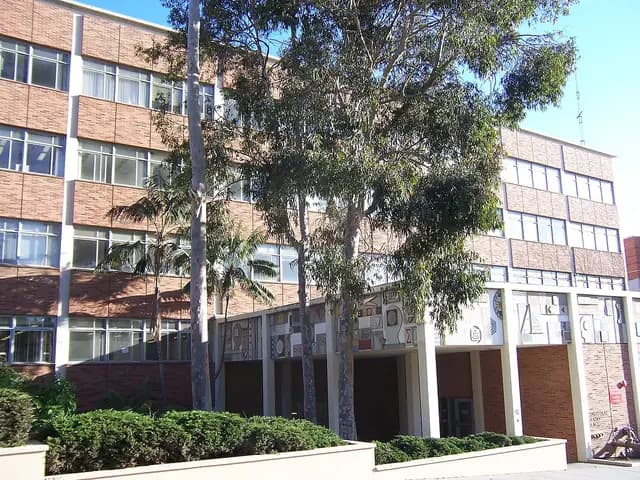
Oleg Alexandrov / Wikimedia Commons / "UCLA Mathematical Sciences Building II" / Public domain
UCLA's Mathematics Department is renowned for its exceptional faculty, top-ranked graduate program, and diverse undergraduate majors. The department houses the Curtis Center, dedicated to mathematical education and K-12 outreach activities. It maintains strong ties with the nearby Institute for Pure and Applied Mathematics. UCLA Math excels in both pure and applied mathematics, ranking #2 in the nation for applied math research. The department is known for cracking challenging pure math problems and holds the 11th global rank among universities. With a focus on advancing mathematical research and addressing real-world issues, UCLA Math shapes the future through innovative solutions.
University of Chicago Math school acceptance rate
University of Chicago's Math acceptance rate is 8.00%.
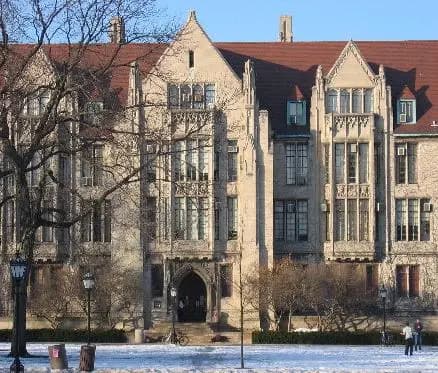
w:User:Crimson3981 / Wikimedia Commons / "Eckhart Hall" / Public domain
The Department of Mathematics offers a Ph.D. program that focuses on providing students with extensive knowledge and rigorous training in various areas of mathematics. The program boasts a first-year curriculum designed to immerse students in cutting-edge mathematical research. With an average of 80 Ph.D. students and an annual intake of 15-20 students, the program is highly selective and aimed at exceptional individuals. Close collaboration with faculty and peers is emphasized, enabling students to actively participate in research and student-led seminars. Located in the vibrant community of Hyde Park, the university benefits from its proximity to downtown Chicago and other renowned institutions, enhancing the overall academic experience.
Conclusion
And there you have it - the top Math graduate schools. These are some of the best schools in the country for Math, and admission into any of them would be a great accomplishment that could set you up for a strong career. Good luck!
Interested in the top graduate schools for other programs?
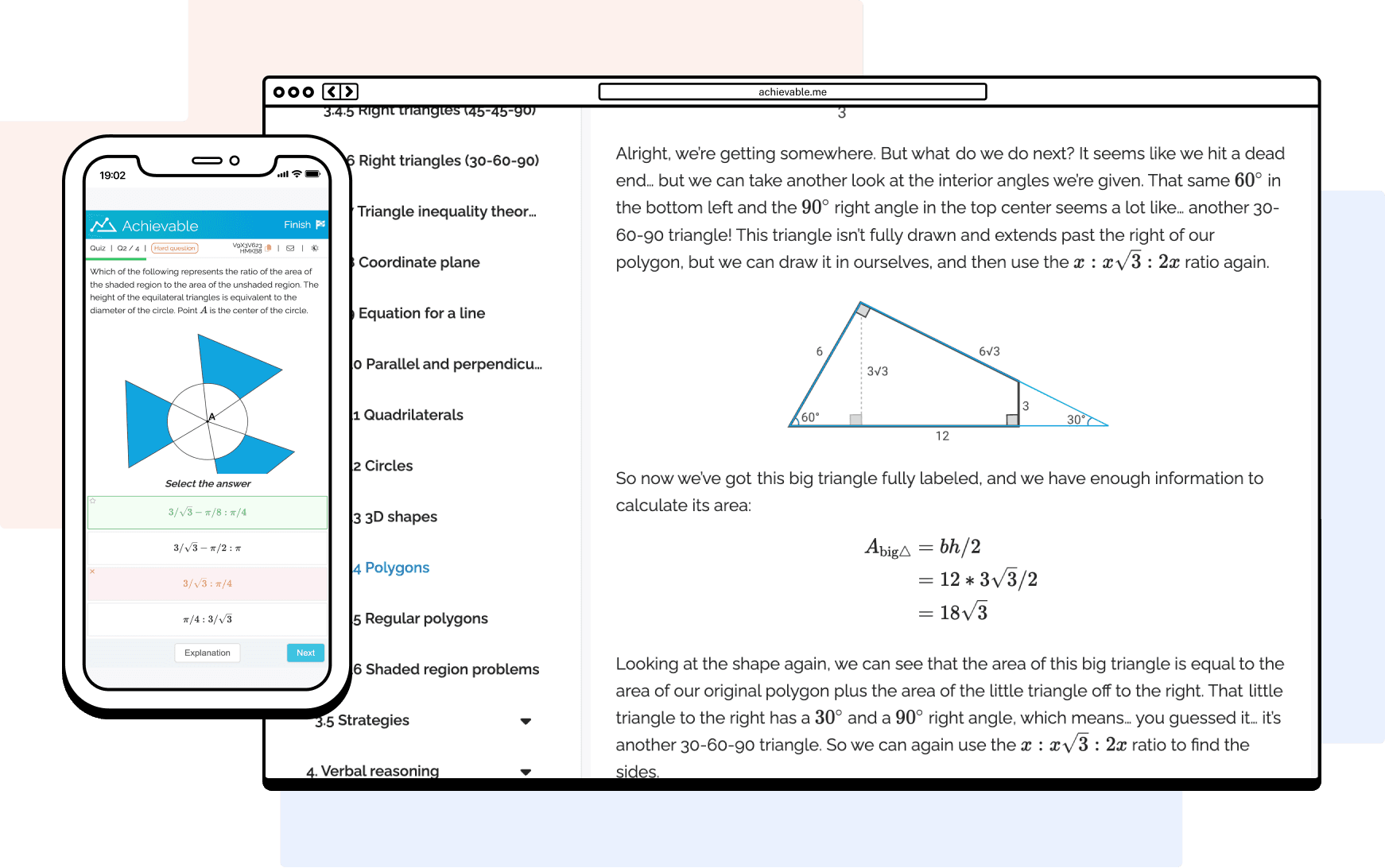
Hit your target score
Achievable is the best online GRE exam prep course: effective, personalized, and convenient. With Achievable, you'll spend less time studying and hit your target score with confidence.